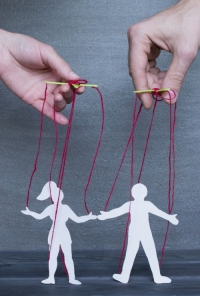Why Manipulation Dominates Relationships – Anne K. Glowacki – Sarasota Counseling
In theory manipulation exists in a variety of settings but one of the most detrimental settings is within a relationship. When couples in counseling want to address this they usually ask for help with where to begin. There are 3 important things to consider that might help lead to a healthier and long-lasting relationship dynamic.
Manipulation used to dominate relationships is not an uncommon phenomenon but rather a prevalent characteristic of many interactions. As a matter of fact, manipulation has become so common place that we no longer notice whether we are in a healthy relationship dynamic. The dysfunction has become the norm, chaos ensues, yet we feel powerless to change. Recognizing manipulative behaviors in others is always easier than recognizing what is going on within oneself. But just like any relationship between two people, there is a give and take, and for every action there is a reaction. So how do we go about removing manipulation from our life? By recognizing those traits or characteristics that cause us to be the giver or receiver of manipulation.
Manipulative behavior almost always is connected with insecurity and low self-esteem. An inability to know our worth and cultivate the relationships we feel we deserve leaves us feeling as though we are not getting our needs met. Inevitably it is human nature to try to regain balance, whether healthy or not, and we behave and act in a manner that will work to help us get those needs met.
For example, we try to get our partner to go along with what we want them to do despite their protests and we then quickly present it from a place of love. Statements such as “if you love me” and “I wouldn’t do it if you asked me not to” are ways we think we are educating our partner on how to handle the situation rather than the actual manipulation that tries to change behavior through guilt and shame. The attempt to try to change behavior really is more about our own personal need of feeling safe and secure. We look to the other person to make us feel safe.
In my Sarasota counseling practice, when working with couples this is usually a very delicate subject because the information is never well received by the one who is manipulating. As a matter of fact, the client is so accustomed to engaging in manipulative behaviors that work in their favor, that they will quickly turn on the clinician for not agreeing with them. Their character is threatened only to learn that something that seemed so natural and resulted in their favor is actually detrimental to the relationship.
So how does one break the cycle of manipulation?
First, focus on self-awareness and self-esteem. Asking yourself why the situation needs to be this way and what are the uncomfortable feelings surrounding it. Sitting with uncomfortable feelings is probably the most difficult thing to do. It is human nature to avoid or remove discomfort, whether it is physical or emotional. The quick reaction to this is to control the situation through manipulation to relieve yourself of the discomfort. So when your feeling threatened or insecure with your partner’s actions you are more likely to engage in manipulation. Learning to sit and feel your emotions takes time and is not always comfortable but trying to understand what creates the feeling in you and how you can help yourself to move through the moment is the better alternative that trying to force your partner to change to fit your comfort level.
Second, those who manipulate have also been manipulated for ever action in life creates a reaction. If you think you are smart enough that you can’t be manipulated than think again. How can I be sure of this? Because as long as guilt and shame exist as part of the human psyche you are also susceptible to being manipulated. When guilt and shame enter for something we have done we are more open to manipulation by our partner to atone for our offenses. That is exactly the moment when you feel yourself succumbing to the manipulation. The discomfort of guilt and shame opens the door for manipulation. Understand that what you are feeling is not always about you and at times it is. We have a tendency to take on displaced feelings which are not ours to take on, but we also owe it to ourselves to be honest and take responsibility for our mistakes and work to resolve it so it shouldn’t happen again. Understanding what is yours to take ownership of and having the courage to own it if you have done it is the balance.
Lastly, look within yourself and not outside yourself. It is very easy to look for external reasons to engage in the behaviors we engage in rather than looking within our self for the catalyst that creates the feelings. When we externalize our emotional states we are also expecting others to help regulate our emotions by keeping a perfect balance in your outside world and that is not realistic. We are the keepers of our emotional state and we have the responsibility of maintaining the balance. It is easy to task others with it when we feel lost. Manipulating people to help us navigate our emotional state to remain calm and content. However, that is not reality as not everyone will understand your emotional goals and when those around your fail to understand or change to meet those goals all the negative feelings about that person come to the surface creating a negative dynamic perfect for manipulation or to be manipulated.
So when we ask our self why we engage in manipulation or allow ourselves to be manipulated it is so that we can regulate our emotional state. Whether we are the giver or receiver of manipulation we do it to avoid an uncomfortable emotional state and we fool ourselves into thinking it is okay because we momentarily feel better. Focusing on the emotions within us may seem tough and difficult at first but if we gain a better understanding of this emotional state within us we are less likely going to try to resolve it externally. Once we master the concept of being okay with our feelings we are moving ourselves in a healthier direction and ensuring our success of a long-lasting health relationship.






